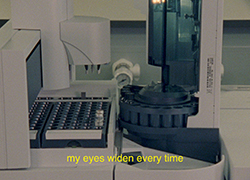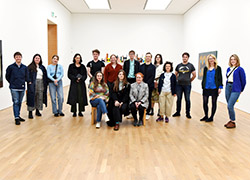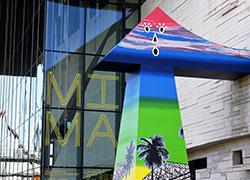Course overview
Curator Apprenticeship at Teesside University
Delivered at the international gallery and museum, MIMA - this apprenticeship is unique to Teesside University.
This unique apprenticeship explores:
- collection development, management (including acquisitions and loans), and historical and contemporary relevance
- research, development and project management of new exhibitions, and curatorial projects and commissioning artists
- interpretation, learning and audience development including digital methodologies
- specialist sector networks and future-proofing your career as a curator.
Curators play a crucial role in bridging the gap between the tangible objects in their care and the public’s understanding and appreciation of those objects. Apprentices develop curatorial practice alongside like-minded individuals from a range of curating contexts, benefitting from the development of an invaluable network to support them in their ongoing career.
We’re the first university to launch a Curator degree apprenticeship, we’ve written a blog that sums it all up nicely. You can read it here.
This apprenticeship aims to:
- advance the apprentice’s knowledge in the understanding of how curating expands and draws from wider contemporary local and global contexts
- support apprentices towards a significant academic understanding and interrogation of their creative work as a professional curator
- engender a peer-community of curatorial thinkers who are committed towards expanding methods and practice
- engage apprentices in the application of creative methods to problem solving and develop on practice-based research methods towards multiple routes of facilitation of knowledge
- sustain the apprentice’s journey towards expanding their intellectual and professional development at an advanced level in the field of presentation of artefacts
- develop the apprentice’s academic and research skills and knowledge by embedding their learning and engagement within the professional context of curation.
Learning takes place during three intensive weeks across the academic year reducing the amount of time your employee needs to spend away from the business. Depending on which option you choose your apprentice could learn at the Middlesbrough Institute of Modern Art (MIMA) in Middlesbrough or our London Campus at Here East, Stratford. Both options benefit from our experienced academics and relationship with MIMA.
Creative UK
 Take advantage of our Creative UK membership and help futureproof your career, with networking events, a resource hub to support professional development, and bespoke workshops in partnership with industry leaders and mentors. Sign up for free student membership to get opportunities, events and newsletters sent directly to your inbox.
Take advantage of our Creative UK membership and help futureproof your career, with networking events, a resource hub to support professional development, and bespoke workshops in partnership with industry leaders and mentors. Sign up for free student membership to get opportunities, events and newsletters sent directly to your inbox.
Please note, we can only respond to enquiries from employers, or individuals with agreement from their employer to undertake an apprenticeship.
Course details
Course structure
Core modules
Curating Collections and Access
You expand your understanding of curatorial practice through engagement with collections, including inclusive and decolonial frameworks within the context of curatorial display. You gain a critical perspective on institutional practices, through a detailed knowledge of collection management and development incorporating audience development projects, communications, interpretation, events and learning programmes.
You develop your critical awareness of social, political, ethical and conceptual issues in and around curation. You explore key theories and practices, both historical and contemporary, developing your curatorial research, analytical and communication skills.
Major Project: Curatorial Practice
This module offers you an advanced learning environment in which to demonstrate an extended professional practice to a level of distinction. Through project supervision you are inspired to build your own creative voice and original practice in the field of curating. You create a portfolio of research and contextual information alongside a presentation of an exhibition, event or project to an audience.
Modules offered may vary.
How you learn
This course is taught in three, one-week blocks and online seminars.
This course is taught in three, one-week blocks and online seminars. The intensive blocks can be attended in Middlesbrough or London.
Off-the-job training
This may include the following work-based activities: shadowing, researching, assisting tours, organising events, risk assessments, management of people, cataloguing, analysis, stakeholder engagement, fundraising, and managing a large research project.
How you are assessed
The apprentice is assessed through reports, project research and development work, presentations and visuals. There are no formal exams.
Degree assessment
Each 60-credit module is assessed through a portfolio submission. The assessments focus on the analytical, professional, theoretical and practical elements of the apprentice's study. They engage with tutors about their unique practice and progress towards their engagement plan.
Gateway
On completion of the module portfolios, apprentices edit these into one larger evidence portfolio in preparation for the end-point assessment. The portfolio should demonstrate the necessary knowledge, skills and behaviours gained throughout teaching to achieve the apprenticeship qualification.
Following completion of the degree and evidence portfolio, a Gateway meeting will take place to confirm that the apprentice meets the requirements and can proceed to the end-point assessment.
Gateway requirements
• employer is satisfied the apprentice is consistently working at, or above, the level of the occupational standard
• English and mathematics Level 2 (or equivalent)
• evidence portfolio.
End-point assessment
The end-point assessment is delivered by an external organisation in line with the apprenticeship standard assessment plan. It consists of two assessment methods:
- professional discussion underpinned by a portfolio
- exhibition project and written report
Successful completion of the two assessment methods will conclude the apprenticeship.
Entry requirements
To be accepted on to an apprenticeship course you must have support from your employer and meet the course entry requirements.
Places on this programme are 95% government funded for employers in the creative and cultural sector. This is open to a wide range of staff at galleries, museums, libraries, and creative organisations, who come to Middlesbrough for week-long residentials then pursue self-directed studies online over two or three years.
The apprentice must be working in an institutional setting with relevant registration and sponsored by you, the employer. The apprentice must also:
- have a minimum of three years full-time or equivalent in part-time hours institutional experience – if they have less than three years’ experience they may be considered following discussion with the course leader providing they have their manager’s support
- hold Level 2 qualifications in English and maths before starting their Teesside University apprenticeship. Find out more.
- attend an interview, a separate induction and a three-way progress review meeting at regular intervals between the apprentice and the University.
Job role responsibilities
Apprentices work within a suitable environment to allow them to research, develop and interpret collections, themes or subjects ensuring accessibility to a diverse range of audiences.
Workplace settings can include but not limited to: museums, galleries, archives, local authorities, universities, historic environments and properties or Trusts.
For general information please see our overview of entry requirements
Employability
Career opportunities
The apprentice is prepared for a career in curating across the cultural and creative industries including visual arts, museums and heritage, programming and creating projects across media, design, performance, fashion, festivals and cross art forms. Curators are increasingly sought by sectors such as teaching, academia, health and the environment, to improve public engagement and communications. Curators have an increasingly vital role in interpreting and selecting content across many areas and managing creative relationships of all kinds, it is a future facing career choice that is exploding and the government has labelled a priority through its apprenticeship scheme.











 Researchers’ short film selected for BFI London Film Festival
Researchers’ short film selected for BFI London Film Festival First curating course cohort begin their studies
First curating course cohort begin their studies Tate and Teesside team up to provide unique curating opportunities
Tate and Teesside team up to provide unique curating opportunities